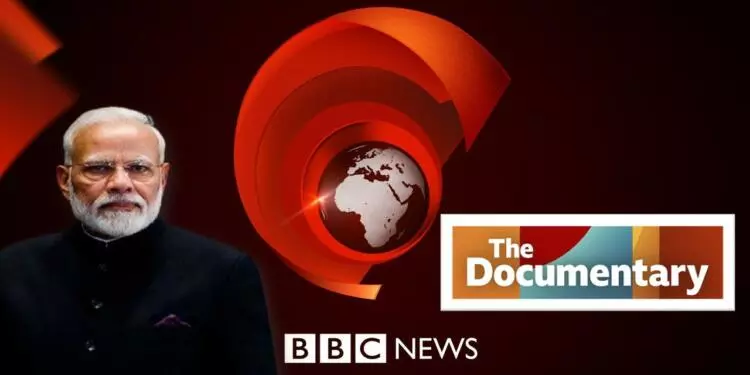
IT Dept 'surveys' in BBC offices continue for a second day
text_fieldsNew Delhi: The Income Tax department's search in the office of the BBC in Delhi and Mumbai has extended to a second day on Wednesday, the BBC and news agencies said.
The broadcaster also said that it will cooperate with the investigation. The inspection in the offices started at 11.30 am on Tuesday and continued late into the night and on to a second day.
The BBC informed that operations in India will continue as before. Some employees have been asked to remain in the office. The rest returned home.
In addition to the income and expenditure statement and balance sheets, the computers of all the employees have been checked. Officials have informed that the seized mobile phone, laptop etc. will be returned after the inspection.
Senior management of the BBC are likely to be questioned on Wednesday.
Media persons and other employees were not allowed to go out or enter in the first phase. The BBC has sent an email to its employees to work at home in view of the IT 'searches' at its offices.
BBC employees have been instructed not to share information related to the inspection on social media.
The Delhi and Mumbai offices were stopped and the hours-long inspection was carried out on the suspicion that they were making misdirected profits through tax evasion without providing accurate figures.
The tax department's survey which started on Tuesday at the BBC's Delhi and Mumbai offices was reported to have extended to at least two linked premises as part of an investigation into alleged tax evasion against the British broadcaster in India.
While journalists and other employees were allowed to leave on Tuesday night, staff in the finance and some other departments were asked to stay back and were queried by the IT officials.
Some computer peripherals and mobile phones were cloned as part of the operation, officials had said.
The survey is being carried out to investigate issues related to international taxation and transfer pricing of BBC subsidiary companies, officials had said on Tuesday.
"The Income Tax Authorities remain at the BBC offices in New Delhi and Mumbai. Many staff have now left the building, but some have been asked to remain and are continuing to cooperate with the ongoing enquiries," a BBC News Press Team said in an official Twitter post on Tuesday night.
"We are supporting our staff during this time and continue to hope to have this situation resolved as soon as possible. Our output and journalism continues as normal and we are committed to serving our audiences in India", the post added.
IT dept officials have been careful to emphasize that the investigative action they carried out was a 'survey' and not a 'search' which is generally called 'raid' in common parlance. While 'raid' is a word not defined in IT Act, 'survey' and 'search' have their own definitions and scope of action.A survey is conducted under Section 133A of the Income Tax Act, which empowers the department to carry out surveys to collect hidden information.
However, the authorisation is to enter any place of business or profession during business hours on business days.
The 'survey's is distinct from a 'search' which, among other differences, can be conducted on any day after sunrise and can continue indefinitely. The scope and definition of a 'search' are contained in Section 132A of the Income Tax Act.
About two dozen income tax officers under the Central Board of Direct Taxes (CBDT) of the finance ministry arrived at the BBC office on the fifth and sixth floors of Hindustan Times House in Delhi before noon on Tuesday.
The Mumbai studio was also searched simultaneously. Income Tax sources explained that the BBC has ignored several notices for non-payment of statutory taxes on income generated through operations in India.
Meanwhile, international bodies, media organisations and India's opposition have condemned the BBC office raids by Indian tax officials. Amnesty International India's Board accused authorities of "trying to harass and intimidate the BBC over its critical coverage of the ruling Bharatiya Janata Party".
The action on the BBC comes in the background of the controversy over the broadcaster's airing of its two-part documentary, 'India: the Modi Question' and the Indian government's various steps to stop its circulation over social media. The video shows the role of prime minister Narendra Modi in the massacres during the 2002 Gujarat riots while he was chief minister of the state.
The ruling BJP has been charging the BBC with venomous reporting.
In that context, BBC said last month that the Indian government was offered a right to reply to the documentary but it declined.
The broadcaster also had said the film was "rigorously researched" and "a wide range of voices, witnesses and experts were approached, and we have featured a range of opinions, including responses from people in the BJP".


























